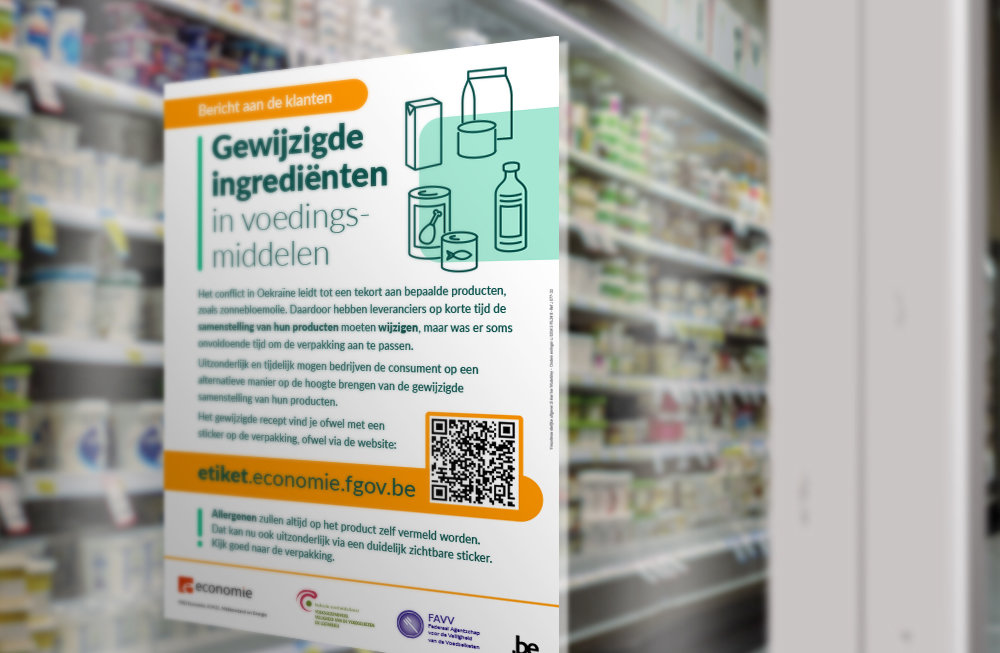


FPS Economy does not rule out scarce ingredients besides sunflower oil being replaced in product recipes without having to change the label. But, obviously, strict rules would apply.
The conflict in Ukraine has led to shortages of raw materials, forcing some food manufacturers to alter the composition of their products. They would normally have to change the labelling, but that isn't always a simple process. Businesses have been left with stocks of printed packaging and labels.

© FPS Economy
FPS Economy has as yet agreed with FPS Public Health and the FFSA only a temporary exception for sunflower oil and other ingredients derived from it. This has been in place since 26 April and lasts for six months. An evaluation is due in August, and at that point the procedure can be extended. The spokesperson for FPS Economy says that further exception procedures for other scarce ingredients have not been ruled out. The procedure relates exclusively to prepackaged foodstuffs sold on the Belgian market, but applies equally to foodstuffs from other member states and third countries that are placed on the Belgian market.
Important Points
The food manufacturer is and always will be responsible for food safety and the quality of the products it places on the market. When product preparation methods are reformulated, special attention must always be given to allergens, nutritional value and health and nutritional claims.
Allergens
If ingredients are added that were not in the product’s original formulation, the preference is for a complete relabelling of the product. Where that is not immediately possible, a sticker showing the new, complete and corrected list of ingredients can be placed over the original. If neither option is viable in the short term, a sticker telling consumers that an allergenic ingredient has been added can be used to mark the change without having to replace the original list of ingredients.
Nutritional Value
When a replaced ingredient leads to a change in the nutritional value and it is not immediately possible to arrange complete relabelling or apply a new, corrected statement of nutritional value, the consumer’s attention must be drawn to the changes via the packaging. This can be achieved by applying a sticker that states the new values for the nutrients concerned.
Health and Nutritional Claims
If the conditions underlying the health and nutritional claims are not satisfied by the new product formulation, stickers to achieve complete relabelling can be used to: conceal claims which the conditions no longer satisfy, or notify consumers that the claims are no longer correct as the product composition has changed. This applies to the A and B scores (green) in the Nutri Score logo. No special measures apply for scores C, D or E.
More (detailed) information
Plan of approach for the labelling issue in relation to foodstuffs intended for human consumption, in the current geopolitical situation: https://economie.fgov.be/nl

“It is always advisable to maintain a critical perspective on your own products and adjust them to contemporary needs where necessary”, emphasises Marijke Adriaens, CEO of frozen food company Fribona. “For consumers, taste is still the main consideration. It is essential to work towards a product that is, above all, tasty and visually appealing.”...

Scientists from KU Leuven have discovered how oil penetrates snacks during and after the frying process. Recent research findings point to advanced frying techniques that reduce oil absorption, as well as innovative methods to limit oil uptake during the cooling phase. This paves the way for the development of healthier snacks without compromising...

Food companies are increasingly targeting a wider range of consumer groups. Speaking at an event organised by Fenavian, Julian Mellentin of New Nutrition Business said this strategy offers significant opportunities to respond to the diverse health needs and interests of today’s consumers. “Consumers enjoy both animal and plant-based proteins”, he...

Backed by financial partners, Start it @KBC is launching the accelerator programme Scale it Agro, aimed at scale-ups offering sustainable and innovative agricultural solutions for agriculture and horticulture businesses. Kjell Clarysse, programme director at Scale it Agro, goes into more detail.